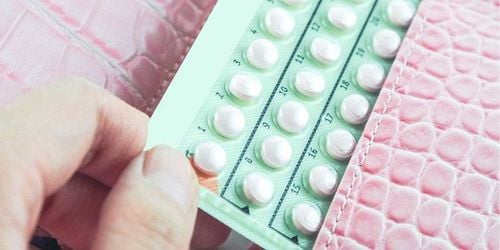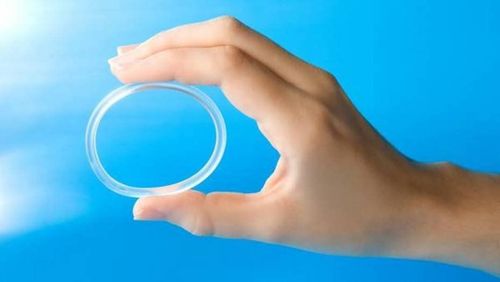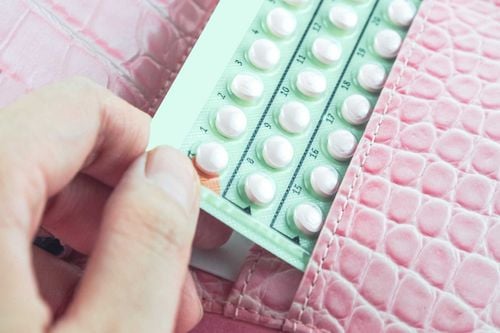This is an automatically translated article.
The article was professionally consulted by Specialist Doctor II Pham Thi Tuyet Mai - Obstetrician and Gynecologist - Department of Obstetrics and Gynecology - Vinmec Hai Phong International General Hospital.1. In what cases is emergency contraception used?
The emergency contraceptive pill is a high-hormone oral contraceptive that is used to reduce the risk of an unwanted pregnancy if protection is not used after having sex.Emergency contraceptive pills work:
Ovarian suppression effect: Contraceptive pills contain sex hormones from the outside into the body, inhibiting the body's secretion of ovestin, thereby inhibiting the regulation secrete FSH and metakentrin, inhibit ovarian ovulation, effectively prevent pregnancy; The effect of changing the cervical mucus: Progestin-containing drugs will make the cervical glands become sticky and prevent sperm from passing through to meet the egg, thereby preventing pregnancy; Changing the morphology of the endometrium: Drugs containing progestin and estrogen from the outside can cause the endometrium to develop poorly, preventing the egg from implanting in the uterus, so it helps prevent pregnancy.
Emergency contraceptive pills are used in cases such as:
Women who have never used any contraceptive method or are not protected by contraceptive methods; When using contraceptive methods fail such as condoms torn, slipped or not used correctly; Missing 3 or more days of daily oral contraceptives; For progestogen-only contraceptives, take 3 hours after the fixed daily dosing time or more than 27 hours after the previous dose; For conventional oral contraceptives (0.75mg), take 12 hours later than the fixed daily dosing time or more than 36 hours after the previous dose; For the progestogen injection norethisterone enanthate (NET-EN) when you are 2 weeks late; For progestogen-only injections depot-medroxyprogesterone acetate (DMPA) when you take it more than 4 weeks late; For combined injectable contraceptives (CIC) it is more than 7 days late.

2. How to use emergency contraception to be effective?
The emergency contraceptive pill is taken as soon as possible, preferably within 72 hours, which is 3 days after having unprotected sex. But until the 5th day after having sex without using safe contraception, you can still use the emergency contraceptive pill, but the effectiveness of the drug will not be high.
If you take emergency contraceptive pills in the first 24 hours, the effectiveness of contraception is up to 95%, if you take the pill after 24-48 hours, 85% effective and after 49-72 hours, the effectiveness is only 58%.
Besides, note:
Do not use more than 2 doses of emergency contraception within a month. Two-pill emergency contraceptive pills need to be taken in full to prevent pregnancy. If your period does not return within 4 weeks of using the emergency contraceptive pill, you are likely pregnant. In this case, users need to immediately go to the nearest medical facility for timely examination and advice.
3. Difficulties when using emergency contraception
3.1. Nausea or vomiting within 2 hours of taking the pill
One of the problems with using the emergency contraceptive pill is that users may experience nausea or vomiting within 2 hours of taking the pill. When experiencing nausea, the user should:
Take the emergency contraceptive pill again as soon as possible. An antiemetic may be used before a repeat dose of the combined oral contraceptive pill, or the repeat dose may be given vaginally if nausea or vomiting persists.

3.2. Delay or menorrhagia after taking emergency contraceptives
Delay or menorrhagia is also one of the difficult problems when using emergency contraception. However, when seeing signs of delay or menorrhagia from 3 to 4 weeks, the user should:
Need to take a pregnancy test or re-examine at a medical facility if the period is late. There is currently no evidence of a risk to pregnancy with the use of emergency contraception and pregnancy, so users do not need to worry too much.
3.3. Irregular vaginal bleeding
When using emergency contraception, it can mask the symptoms of cervical cancer or endometrial cancer, so it is necessary to have regular checkups (6-12 months) department to rule out cancer.
Besides, some difficult problems after using emergency contraception such as: Stomach pain; headache ; dizzy; chest pain.
Emergency contraception is a double-edged sword because it can affect the fertility of the user if abused this method of contraception. Therefore, you should apply safer methods such as using condoms, placing an IUD, taking oral contraceptives every day, etc. Carefully follow the instructions on how to use the drug, take it as soon as possible after sex, take the full dose and strictly follow the instructions.
Please dial HOTLINE for more information or register for an appointment HERE. Download MyVinmec app to make appointments faster and to manage your bookings easily.














